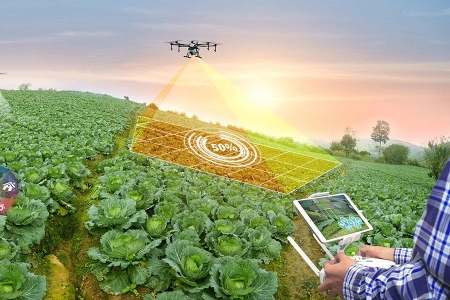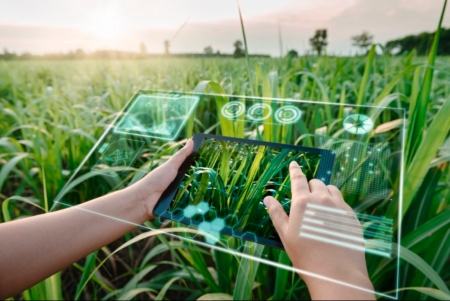We build digital products to help businesses succeed!
Introduction
In the realm of AI agriculture, a transformative wave is reshaping the landscape of traditional farming. As we harness the capabilities of sustainable farming AI, we’re witnessing a revolution in how we grow our food, manage resources, and predict agricultural outcomes. With crop monitoring AI leading the charge, farmers are now equipped with data-driven insights that foster more resilient and productive practices. According to Deloitte, the deployment of IoT endpoints for precision farming is expected to reach nearly 300 million by the end of 2024, marking a 50% increase from 2022.
This surge underscores the pivotal role of AI in driving efficiency and sustainability in agriculture. Furthermore, Gartner highlights that over half of organizations now prioritize AI in evaluating new use cases, reflecting the growing significance of AI’s role across industries. By integrating AI into agriculture, we’re not only optimizing yields but also paving the way for a future where farming works in harmony with the environment, ensuring food security and ecological balance for generations to come.
What is Artificial Intelligence in Agriculture?
Artificial Intelligence (AI) in agriculture represents the cutting-edge convergence of technology and farming practices, aimed at enhancing productivity, sustainability, and efficiency. AI agriculture leverages machine learning algorithms, data analytics, and IoT devices to interpret complex agricultural data. This enables farmers to make informed decisions that lead to improved crop health and yield.
The core of sustainable farming AI lies in its ability to analyze vast amounts of data from satellite images, sensors, and drones. This analysis helps in crop monitoring AI, detecting nutrient deficiencies, water stress, and more, allowing for precise intervention. Moreover, AI-driven solutions can predict pest attacks, enabling proactive pest control measures, thus safeguarding crops and reducing the need for chemical pesticides.

How to Use AI in Agriculture? Top 10 Uses of AI In Agriculture
The integration of AI in agriculture is revolutionizing the way we approach farming, making it more efficient and sustainable. Here are ten practical examples of how AI can be applied in the agricultural sector:
1. Predictive Analytics for Crop Yield:
Utilizing crop monitoring AI wherein AI’s predictive models analyze past and present data to analyze weather patterns, soil conditions, and historical data to predict crop yields with greater accuracy. This allows the farmers to plan better and reduce risks. By understanding weather trends and soil conditions, AI can suggest the best planting times and crop varieties for maximum yield.
2. Automated Pest Identification:
Implementing image recognition AI to detect and classify pests, enabling timely and targeted pest control measures. AI systems can quickly identify pest species from images captured by cameras in the field, providing early warning and reducing crop damage. This technology also helps in tracking pest population dynamics, ensuring timely and effective pest management strategies.
3. Precision Farming:
Leveraging sustainable farming AI to precisely apply water, fertilizers, and pesticides, reducing waste and environmental impact. AI optimizes the application of inputs based on real-time field data, leading to cost savings and reduced environmental impact. It enables farmers to apply the exact amount of water, fertilizer, and pesticides needed, minimizing runoff and pollution.
4. Drone-Assisted Aerial Surveillance:
Drones equipped with AI analyze crop health from above, providing valuable data for farmers to act upon. They check on crop health over large areas, identifying issues like nutrient deficiencies or water stress. This bird’s-eye view allows for rapid response to problems, ensuring crops remain healthy and productive.
5. Machine Learning for Soil Health:
Analyzing soil samples with AI to determine nutrient levels and recommend amendments to improve soil health. AI can predict which crops will thrive in certain conditions, and recommend specific fertilizers to improve soil health. This leads to healthier crops and a more sustainable use of land resources.
6. Smart Irrigation Systems:
Using AI to monitor weather forecasts and soil moisture levels to optimize irrigation schedules and conserve water. AI-driven irrigation systems use weather and soil moisture data to water crops only when necessary, conserving water. These systems can adapt to changing weather conditions, ensuring crops receive the right amount of water at the right time.
7. AI-Powered Sorting Robots:
Deploying robots that use AI to sort ripe produce and separate it with minimal damage to the plants. These robots sort the ripe fruits and vegetables with precision and reduce waste. They work around the clock, helping to address labor shortages and increase efficiency.
8. Forecasting Market Demand:
AI algorithms forecast demand and help streamline the agricultural supply chain, reducing food waste. It helps predict demand for crops, allowing farmers to plan their harvests more effectively. This reduces food waste and ensures that produce reaches the market at peak freshness, benefiting both farmers and consumers.
9. Chatbots for Farmer Assistance:
Implementing AI chatbots that provide farmers with an interface to instant access to their customers or sellers. These chatbots can also give farmers instant advice on crop management, pest control, and market trends. They act as a 24/7 helpline, offering solutions and support to improve farm productivity.
10. Collaborative AI Research Platforms:
Partnering with AI agriculture companies to share data and insights, fostering innovation and driving the industry forward. Farmers and AI agriculture companies can develop better AI tools tailored to specific farming needs. These platforms encourage innovation and help farmers stay competitive in a rapidly evolving industry.
By understanding what artificial intelligence in agriculture is and how AI can help agriculture and farmers can adopt these technologies to enhance their operations. The use of AI in agriculture involves not only the adoption of these tools but also a willingness to innovate and embrace new methods for a more prosperous and sustainable future.

The Rise of AI Agriculture Companies: 10 Pioneers of Innovation
The agricultural sector is undergoing a significant transformation, thanks to the advent of AI. Here’s a closer look at 10 companies leading the charge in AI agriculture, each playing a pivotal role in advancing sustainable farming AI and crop monitoring AI, trailblazers in showing how AI can help agriculture evolve into a more efficient, sustainable, and productive industry.
- The Climate Corporation: This company is at the forefront of AI agriculture, offering a digital platform that uses data science to help farmers improve their productivity. Their predictive analytics for crop yield is a game-changer, enabling better planning and risk management.
- Blue River Technology: Known for their See & Spray technology, Blue River Technology uses computer vision and machine learning to make weed control more efficient. Their precision spraying reduces herbicide usage significantly, contributing to more sustainable farming AI practices.
- John Deere: A household name in farming equipment, John Deere has integrated space technology, AI, and advanced data analytics to monitor crops, assess field conditions, and optimize resource allocation, leading to improved yields and reduced environmental impact. Their precision farming tools are helping farmers plant and fertilize more effectively, optimizing resource use and boosting yields.
- AeroVironment-Quantix: Specializing in drone technology, AeroVironment provides farmers with detailed aerial imagery that can be analyzed using AI to improve crop management and health, leading to more efficient farming practices. A testament to the power of crop monitoring AI.
- Trace Genomics: By analyzing soil samples with machine learning, Trace Genomics helps farmers understand their soil’s health and how to enhance it, offering personalized recommendations to improve crop health and yield, which is crucial for AI agriculture’s goal of sustainability.
- Rachio: Rachio’s smart irrigation systems embody how AI can help agriculture by using weather and soil moisture data to conserve water and reduce costs, showcasing the practical benefits of sustainable farming AI. Rachio utilizes AI to enable efficient crop production and real-time monitoring, empowering farmers with valuable insights and decision-making support.
- Harvest CROO Robotics: Their strawberry-picking robots demonstrate how to use AI in agriculture. These robots can identify and harvest ripe berries efficiently, addressing labor shortages and reducing waste. They are focused on automating the crop management, harvesting, and packing of specialty crops, starting with strawberries, to address labor shortages and increase efficiency.
- IBM Watson Decision Platform for Agriculture: IBM’s platform uses AI to optimize the agricultural supply chain. Combines AI, analytics, and predictive insights with IoT data to help stakeholders make faster, more informed agricultural decisions. Their predictive insights help farmers reduce waste and ensure that produce is fresh when it reaches the market.
- Plantix: A free AI-driven mobile application that aids farmers with information on diseases, pest infestation, and nutrient deficiency, improving crop yields and reducing pesticide use. Plantix offers an app that uses AI to diagnose plant diseases and pests. Their service is a prime example of AI agriculture companies providing accessible solutions to farmers for better crop health.
- Growers Edge: Growers Edge uses AI to analyze data and provide financial and risk management tools to farmers. It provides fintech and data solutions for the agriculture sector, aiming to make agriculture more innovative and sustainable through risk management and financing solutions. They exemplify the collaborative spirit of AI agriculture companies, driving innovation and competitiveness.
Conclusion
In essence, AI is revolutionizing agriculture, fostering sustainable practices and enhancing crop monitoring. As we’ve explored, sustainable farming AI and crop monitoring AI are not mere buzzwords but pivotal tools reshaping the agricultural landscape. Crop monitoring AI has become a cornerstone of modern agriculture, providing farmers with unprecedented insights into their fields. This technological integration promises a future where farming is both productive and eco-friendly, led by innovative companies at the forefront of this transformative movement. As we look into the future, it’s clear that AI-enhanced agricultural practices are not just a fleeting trend but the foundation of a more sustainable and prosperous global food system. The fusion of AI with agriculture promises a future where feeding the world and caring for the planet go hand in hand.
Offices
India
86P, 4th Floor, Sector 44, Gurugram, Haryana 122003Singapore
#21-02, Tower 2A, The Bayshore condo, Singapore 469974Canada
8 Hillcrest Avenue Toronto ON M2N 6Y6, CanadaUS
31 River CT, Jersey City, New JerseySubscribe to our newsletter
Our Services
Top Reads
India
86P, 4th Floor, Sector 44, Gurugram, Haryana 122003
Singapore
#21-02, Tower 2A, The Bayshore condo, Singapore 469974
Canada
8 Hillcrest Avenue Toronto ON M2N 6Y6, Canada
US
31 River CT, Jersey City, New Jersey
Contact us
info@primathon.in
+91-9205966678
Reviews


